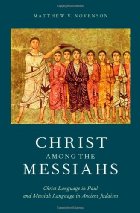 Continuing the series on Matthew Novenson’s Christ among the Messiahs . . . .
Continuing the series on Matthew Novenson’s Christ among the Messiahs . . . .
Before addressing some of the passages in Paul’s letters in order to demonstrate, by reference to earlier posts in this series, that Paul’s concept of Messiah/Christ fell within the framework of the common Jewish understanding of the term, I cover here some well-known phrases Paul uses for Christ — “in Christ”, and his habit of switching the order of its use as in Christ Jesus and Jesus Christ. Novenson examines these common phrases to see if they throw light on what Paul meant by the term “Christ”.
We will see that For Paul, as for his fellow Jews, the “Messiah/Christ” was an anointed, conquering and liberating Israelite king. What was striking about Paul’s concept was the means by which the Messiah would conquer. I think this has implications for the traditional model of Christian origins that argues the earliest Christians turned the concept of Messiah on its head. Followed through, I also think the question has implications for the question of Christian origins itself, but none of that is touched by Novenson, of course, and I am sure Novenson is far more deeply embedded in the conventional wisdoms of Christian origins than I am.
Here is an outline of Novenson’s discussion of what may or may not be gleaned of Paul’s meaning from some short phrases. It is very much an outline only since I avoid the details of the grammatical arguments here.
Paul’s variant terms for Jesus
Paul speaks of “Jesus”, of “Christ”, of “Jesus Christ” and “Christ Jesus”. Scholars have debated the significance of these variations and many have concluded that the “Christ” is simply another name, like “Jesus”, without any particular messianic import that would be recognized by his fellow Jews. Novenson disagrees. Without going into the details of the arguments, there is one memorable analogy Novenson offers that would seem to clinch the argument against Christ and Jesus both being mere names. Julius Caesar was always Julius Caesar, never Caesar Julius. But Jesus Christ could quite comfortably also be Christ Jesus.
The fact that the order of the two terms is interchangeable strongly suggests that it is not a true double name but rather a combination of personal name plus honorific. (p. 134)
“In Christ”
Most scholarship concerning this phrase, Novenson informs us, has been concerned with exploring Continue reading “Christ among the Messiahs — Part 4”
